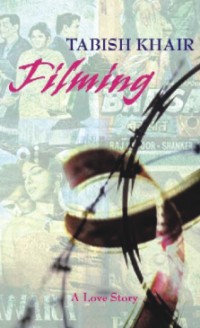Book Review
Blurring the Boundaries
ANITA SETHI finds characters struggling with reality as India goes through Partition in Tabish Khair's Fliming
 |
Filming: A Love Story
by Tabish Khair
404pp, Picador, £16.99 |
Harihar is a man whose heart is so firmly wedded to his dreams that he has little love remaining for flesh-and-blood reality. He quits his job as a postal clerk in 1920s India and pursues his obsession with film-making with the single-minded intensity of Ahab questing for a white whale. He meets a prostitute 15 years his junior, who does not sleep with him but listens to his dreams, and they end up marrying. But Harihar is a Hindu and the prostitute must change her Muslim name to Durga, one of Filming's many instances of attempts to sidestep reality. Its plot, like a Bollywood melodrama, teems with characters and incident, unspooling from their meeting to the present day. Dream sequences are intertwined with potted histories of two inventions, barbed wire and photography, as Khair is fascinated by them as ways of "defining a borderless reality" - a central theme in a novel with Partition as its backdrop.
Loneliness and longing permeate Filming, "for we are always alone in dreams". The couple initially travel together through the country with their son Ashok, showing silent films to rural audiences, but there is an unbridgeable emotional gulf between them as Harihar ignores Durga's pinings for roots and stability. Then Harihar sells Ashok to a landowner's son in exchange for becoming a film director in a studio near Bombay, a "house of ghosts" rather than a longed-for real home to Durga, who works there too. This allows Khair to depict the infant movie industry of the 1940s, and also show celluloid dreams and history colliding; violence comes to the studio as the previously harmonious relationship between Hindus and Muslims becomes tense in the aftermath of Indian independence and the birth of Pakistan.
Often unable to inhabit the present moment, Filming's characters tend to slide instead between traumatic memories and grandiose dreams, and it is here that the novel finds its considerable emotional force. They are drawn back to moments that they can neither forget nor forgive, "entangled in the barbed wire of history", attached to the past by pain - as when one man ("back again his mind moves, swinging on the long thin thread of hurt") is compelled to remember a whipping from his father and the humiliation of his mother watching him being beaten with birch sticks but failing to rescue him.
Khair's narrative method and style erase boundaries, bringing together the normally separate. Words roll into each other without punctuation in the dream sequences, which return to the disastrous fires of 1947 ("the fire had eaten all demarcation away reduced everything to the bone of soot and death"); and different times coexist in each character's mind, a "magical darkness" that recurring metaphors compare to a movie theatre. It's a technique that is sometimes trying and even exhausting, but it can also be highly effective.
Preoccupied with the powers and limitations of art, Filming is full of gaps and silences: the silent films that star Saleem, a Muslim actor who becomes caught up in the inter-communal violence; Harihar's inability to articulate his desire for film because it is so strong; the omissions in the memories of Batin, an elderly scriptwriter who worked for Harihar and recalls a great deal (when interviewed by a cinema historian) about the tragic events of the 1940s but keeps quiet about his own role until the end. Batin knows that words will expose the gulf between what their writers dream and what they achieve, but that they must write anyway. Similarly, this novel, though too ambitious and convoluted, valiantly tells the story of human imagination bringing into being flawed yet necessary creations.
Copyright
(R) thedailystar.net 2010 |
